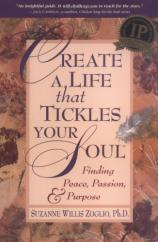Reading Group Guide
Discussion Questions
Create A Life That Tickles Your Soul

1. How would you describe your response to being physically tickled? Stimulated... alert... enlivened... engaged... vulnerable... exhausted... satisfied... other? Do you see any parallels between being physically tickled and living a life you love?
2. This book has been described as "an interesting blend of the mystical and practical." What are some examples of the spiritual/mystical theme running through the book? Which ideas or activities presented did you find rather practical?
3. Zoglio suggests that five elements critical to satisfaction in life are authenticity, self-mastery, relationships, growth, and meaning. From your own personal experience, which of these elements do you think we need most at age 30? 40? 50? 60+? What drives our need for greater levels of one element or another at various adult development stages?
4. The quotation at the beginning of Chapter One reads: "A great life is born in the soul, grown in the mind, and lived from the heart." What does "born in the soul" mean to you? How is each of the five elements mentioned above affected by what "grows in your mind?" When the author refers to "living from the heart," what do you think she means?
5. In the beginning of Chapter Two, the author reviews various life patterns that can sabotage a person's quest for happiness. Take a few moments individually to jot down a life pattern or self-sabotaging behavior that you have observed either in yourself or someone else. What helped to modify the behavior?
6. Zoglio writes that we can "lighten up by letting go," by forgiving ourselves or others, by releasing old expectations, by completing things that are on our to-do list. Describe a situation when you experienced a surge in energy by forgiving, relinquishing expectations, or completing something. Why do you think these releases have the potential to energize us?
7. In Chapter Three, the author introduces several techniques for maintaining a positive attitude: affirmations, visualization, reframing, solution sleuthing (turning complaints into questions), going to the balcony, feeding your esteem, meditation or prayer. Which, if any, have you successfully applied and how have you "customized" them for yourself? What other tips can you share for maintaining a positive attitude?
8. Zoglio uses a dance analogy in discussing how some people allow themselves to be lifted by the beauty and delights in life while others resist. What you "allow" it, what lifts your spirit, makes you feel loved, and gets your creative juices flowing? What sometimes gets in the way of you enjoying all that is available to you?
9. To love others - it is often said - one must first love oneself. In Chapter Five Zoglio adds, "Then you will seek deep connections instead of attention and intimacy instead of activity." What behaviors signal to you that someone is looking for a connection rather than just attention, and what behaviors signal a search for intimacy vs. activity?
10. "Beyond familiarÉjust past fear... that's where life expands." So begins Chapter Six, which discusses the Swahili word "utoto" and the principle in Physics referred to as "entropy." The message here is clearly the importance of viewing oneself as a "work in progress," but learning, risking, and changing all involve facing fears. Consider the differences between these two types of fear: fear of what we might lose if we take a risk and fear of what we might miss if we don't take a risk. How might your stage of life influence what you fear, and how might what you fear influence your stage of life?
11. When the author refers to "what satisfied people say makes them bounce out of bed each morning," she's referring to having a purposeÉusing what you have been given to make a difference in the lives of others. Who are some of the happiest people you know, and are they applying unique gifts? Do you know an unhappy person who is gifted, but not applying his or her unique gifts? What do you think about the idea of giving away what you most need?
12. In the Epilogue of Create A Life That Tickles Your Soul, the author prepares us for four different paths we are likely to travel before making the changes that make life more meaningful: denial (no need for change), awareness (acknowledge you want something more, exploration (trial and error), doubt (a lack of belief that you can cope) Can you remember a change that took you down all four paths? How did you feel during each stage?
13. Which of the strategies/tips outlined in the book will you use when you face change in the future? How has your attitude about change and its relationship to life satisfaction been affected by reading this book? In what ways has Create A Life That Tickles Your Soul left you more comfortable with seeing your self as a "work in progress" and your life as an ever-expanding adventure?
Create A Life That Tickles Your Soul
- Publication Date: June 1, 2000
- Paperback: 208 pages
- Publisher: Tower Hill Press
- ISBN-10: 0941668126
- ISBN-13: 9780941668125







